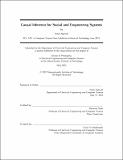Causal Inference for Social and Engineering Systems
Author(s)
Agarwal, Anish
DownloadThesis PDF (4.788Mb)
Advisor
Shah, Devavrat
Terms of use
Metadata
Show full item recordAbstract
What will happen to Y if we do A? A variety of meaningful social and engineering questions can be formulated this way: What will happen to a patient’s health if they are given a new therapy? What will happen to a country’s economy if policy-makers legislate a new tax? What will happen to a data center’s latency if a new congestion control protocol is used? We explore how to answer such counterfactual questions using observational data—which is increasingly available due to digitization and pervasive sensors—and/or very limited experimental data. The two key challenges are: (i) counterfactual prediction in the presence of latent confounders; (ii) estimation with modern datasets which are high-dimensional, noisy, and sparse.
The key framework we introduce is connecting causal inference with tensor completion. In particular, we represent the various potential outcomes (i.e., counterfactuals) of interest through an order-3 tensor. The key theoretical results presented are: (i) Formal identification results establishing under what missingness patterns, latent confounding, and structure on the tensor is recovery of unobserved potential outcomes possible. (ii) Introducing novel estimators to recover these unobserved potential outcomes and proving they are finite-sample consistent and asymptotically normal.
Finally, we discuss connections between matrix/tensor completion and time series analysis; we believe this could serve as a basis to do counterfactual forecasting.
Date issued
2022-05Department
Massachusetts Institute of Technology. Department of Electrical Engineering and Computer SciencePublisher
Massachusetts Institute of Technology